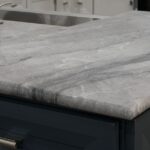White quartz is a beautiful engineered stone that’s perfect for a countertop. It has a marble-looking style, while being much harder and more resistant. But, of course, when buying a countertop, one of the things you worry about is maintenance. So, one question that may cross your mind is: does white quartz stain?
Natural stones are porous, meaning they are prone to staining. But, to handle that, they’re normally sealed using some kind of waterproof resin. Quartz, however, is not a natural stone. It’s an engineered stone, a mix of resin and quartz, made to look like a natural stone. So, how does it handle stains?
Does white quartz stain easily?
No, it doesn’t stain easily. Quartz slabs make for some of the most stain resistant stones out there. They don’t even need to be sealed before being put to use, since they are impervious by nature. That makes them some of the best stones for kitchens and bathrooms.
That’s because quartz slabs aren’t natural stone, they’re engineered stones: they are a mixture of quartz stones along with resin, at about 95% quartz to 5% resin in general. This pretty much gives the stone a built-in sealant.
However, it being stain resistant doesn’t mean that it’s invulnerable to staining. Liquids with strong colors, like red wine and coffee, can still stain it if you leave them there long enough., other liquids may react with the resin, leaving chemical stains. The stone being white also means that those marks will be easily noticeable if that happens. So, to prevent that, clean up spills as soon as you notice them.
It’s important to note that the resin is the weakest link here. It’s much easier to damage and much more reactive to different chemicals than the stone itself. One of the things you have to worry about, for example, is heat: while quartz is very heat-resistant, the resin is not. Putting a hot pan directly onto it can leave stains that won’t come off.
Cleaning it up
Another common source of stains are cleaning products. Some kinds of cleaning products can end up damaging the resin, the stone, or even both, and leave a stain that won’t come off.
Strong cleaning products are some of the more obvious culprits, like bleach and paint thinners. However, weaker products like detergents and oil soaps may also damage it, depending on how good they are at dissolving organic matter, as the resin is organic.
Your best bet for cleaning white quartz countertops, in this case, is using gentler soaps. For example, dishwasher soaps may be a good choice. They’re still very good at cleaning things up, but they’re not strong enough to end up damaging the slab.
However, it’s important to know about a common pitfall: quartz and quartzite are two different things. Quartzite is a natural stone that has been sealed, while quartz is a kind of engineered stone. While both of them are very hard, quartzite is much more porous, meaning it’s also more prone to stains.
While the sealer used for quartzite is very helpful to keep it clean, it’s not nearly as resistant as the stone, so over time it gets stained more easily. To keep it waterproof, it needs to be resealed from time to time.
Keeping your white quartz clean
The best way to avoid stains on white quartz is, of course, by using preventive measures. If you can, it would be a good idea to have some kind of waterproof covering on the slab. It could, for example, be transparent, so that you can still enjoy its looks.
If you’d prefer not to do that, then cleaning spills as soon as you see them is the best option. Keep a clean rag nearby and be prepared to use it as quickly as possible. If you have children, it’s also better not to let them play on it, unless you can cover it with something waterproof and resistant enough beforehand.
While strong-colored liquids and cleaning products are the most common causes of staining, there are some other factors you should take into account too. For example, dirt and food residue can pile up on the surface, which can slowly stain it over time. So, cleaning the slab daily using soft cloths and products is a good way to keep it looking clean.
Another problem are scratches. Over time, the slab may start to look dull. That may not be necessarily because of stains, though. While quartz is very scratch resistant, it’s not immune to scratching, so it slowly adds up over the years.
While scratches, deep stains and chemical stains can’t really be removed with gentle cleaning, there is still hope for your slab. If you need to, you can polish it to make it look better. Polishing removes the topmost layer of the slab, meaning it takes stains and scratches away with it, leaving a nice, smooth finish.
We’re here to help you if you need
If you need help maintaining your slab, it’s a good idea to call professionals to handle the problem and give you more specific advice. There are many kinds of quartz stones around, and they can react differently to different products. So getting professional advice is a good way to keep it looking good and prevent your white quartz from getting a stain.
Also, if you realize that you have stains that won’t come off or enough scratches to make the stone look dull, you’ll want to give it a professional polish. Being a very hard stone, trying to hand polish it will be a greater problem than it’s worth.
You’ll need a grinder and specialized equipment to give it a nice finish, including polishing compounds of different grits, protective equipment, masks, and a big enough place where you’d be free to make a mess. It’s a pretty tough process, but gives great results.
So, if you need help with your stone countertop, white quartz or not, be sure to contact us! We specialize in these kinds of stone and will be able to help you out, whatever the problem.



